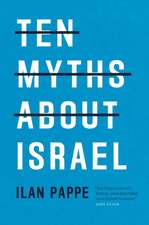From Ephrem to Romanos: Interactions between Syriac and Greek in Late Antiquity: Variorum Collected Studies
Autor Sebastian Brocken Limba Engleză Hardback – 28 iun 1999
Din seria Variorum Collected Studies
-
 Preț: 313.38 lei
Preț: 313.38 lei -
 Preț: 311.41 lei
Preț: 311.41 lei -
 Preț: 308.04 lei
Preț: 308.04 lei -
 Preț: 325.68 lei
Preț: 325.68 lei -
 Preț: 406.12 lei
Preț: 406.12 lei -
 Preț: 311.18 lei
Preț: 311.18 lei -
 Preț: 325.31 lei
Preț: 325.31 lei -
 Preț: 396.01 lei
Preț: 396.01 lei - 9%
 Preț: 1039.89 lei
Preț: 1039.89 lei -
 Preț: 266.20 lei
Preț: 266.20 lei -
 Preț: 358.42 lei
Preț: 358.42 lei - 9%
 Preț: 938.10 lei
Preț: 938.10 lei -
 Preț: 351.48 lei
Preț: 351.48 lei - 9%
 Preț: 938.86 lei
Preț: 938.86 lei -
 Preț: 335.37 lei
Preț: 335.37 lei - 9%
 Preț: 937.14 lei
Preț: 937.14 lei -
 Preț: 351.42 lei
Preț: 351.42 lei -
 Preț: 328.48 lei
Preț: 328.48 lei - 38%
 Preț: 766.84 lei
Preț: 766.84 lei - 23%
 Preț: 315.48 lei
Preț: 315.48 lei - 36%
 Preț: 740.06 lei
Preț: 740.06 lei - 39%
 Preț: 684.75 lei
Preț: 684.75 lei - 29%
 Preț: 247.40 lei
Preț: 247.40 lei - 37%
 Preț: 488.89 lei
Preț: 488.89 lei - 38%
 Preț: 766.91 lei
Preț: 766.91 lei - 38%
 Preț: 769.51 lei
Preț: 769.51 lei - 38%
 Preț: 769.85 lei
Preț: 769.85 lei - 36%
 Preț: 823.43 lei
Preț: 823.43 lei - 25%
 Preț: 225.28 lei
Preț: 225.28 lei - 27%
 Preț: 225.54 lei
Preț: 225.54 lei - 38%
 Preț: 767.07 lei
Preț: 767.07 lei - 38%
 Preț: 764.20 lei
Preț: 764.20 lei - 36%
 Preț: 736.38 lei
Preț: 736.38 lei - 34%
 Preț: 738.43 lei
Preț: 738.43 lei - 27%
 Preț: 226.52 lei
Preț: 226.52 lei - 37%
 Preț: 491.66 lei
Preț: 491.66 lei - 37%
 Preț: 485.78 lei
Preț: 485.78 lei - 37%
 Preț: 485.78 lei
Preț: 485.78 lei - 38%
 Preț: 766.34 lei
Preț: 766.34 lei - 36%
 Preț: 739.17 lei
Preț: 739.17 lei - 34%
 Preț: 473.94 lei
Preț: 473.94 lei - 18%
 Preț: 843.63 lei
Preț: 843.63 lei - 38%
 Preț: 774.91 lei
Preț: 774.91 lei - 38%
 Preț: 769.92 lei
Preț: 769.92 lei - 38%
 Preț: 764.20 lei
Preț: 764.20 lei - 50%
 Preț: 488.81 lei
Preț: 488.81 lei - 36%
 Preț: 488.49 lei
Preț: 488.49 lei - 38%
 Preț: 769.10 lei
Preț: 769.10 lei - 38%
 Preț: 766.99 lei
Preț: 766.99 lei
Preț: 764.20 lei
Preț vechi: 1239.39 lei
-38% Nou
Puncte Express: 1146
Preț estimativ în valută:
146.28€ • 158.94$ • 122.95£
146.28€ • 158.94$ • 122.95£
Carte tipărită la comandă
Livrare economică 21 aprilie-05 mai
Preluare comenzi: 021 569.72.76
Specificații
ISBN-13: 9780860788003
ISBN-10: 0860788008
Pagini: 351
Dimensiuni: 150 x 224 mm
Greutate: 0.45 kg
Ediția:1
Editura: Taylor & Francis
Colecția Routledge
Seria Variorum Collected Studies
Locul publicării:Oxford, United Kingdom
ISBN-10: 0860788008
Pagini: 351
Dimensiuni: 150 x 224 mm
Greutate: 0.45 kg
Ediția:1
Editura: Taylor & Francis
Colecția Routledge
Seria Variorum Collected Studies
Locul publicării:Oxford, United Kingdom
Cuprins
Contents: Greek and Syriac in Late Antique Syria; Eusebius and Syriac Christianity; The Syriac background to the world of Theodore of Tarsus; From Ephrem to Romanos; Ephrem’s verse homily on Jonah and the repentance of Nineveh: notes on the textual tradition; Two Syriac verse homilies on the binding of Isaac; Syriac dispute poems: the various types; A dispute of the Months and some related Syriac texts; Tales of two beloved brothers: Syriac dialogues between body and soul; The Baptist’s diet in Syriac sources; Two Syriac poems on the invention of the Cross; Some uses of the term theoria in the writings of Isaac of Nineveh; The Syriac commentary tradition; The Syriac background to Hunayn’s translation techniques; Greek words in Syriac: some general features; ’The scribe reaches harbour’; Addenda and corrigenda; Index.
Recenzii
'In this volume, some of the most recent and defining work of Professor Brock’s career, heretofore often available only with difficulty outside Europe or the Middle East, is conveniently gathered.' Journal of Early Christian Studies 'Brock holds the distinction of being the greatest scholar of Syriac literature and culture alive today. All scholars of Eastern Christian culture and liturgy will want to have access to this volume.' Religious Studies Review 'Professor Brock writes plainly, interestingly, and with a marvellous command of the subject. Each essay may start from a detail, but it expands the mind to survey a whole scene. Wonderfully educative pieces!' Journal of Theological Studies 'Everyone who wishes to consult the essays by the scholar currently most familiar with Syrian Literature, which have been published in various places before, will be most grateful for now having easy access to them in this collection.' Oriens Christianus
Descriere
It is often forgotten that many people in Late Antique Syria were bilingual in Syriac and Greek. The 16 articles in this volume explore different aspects of the interaction between these two literary cultures, exemplified in the works of two of the greatest Christian poets and hymnographers of the period: Ephrem the Syrian and Romanos the Melode. Among the topics covered are the legend of King Abgar and the origins of Christianity in Edessa, Syriac texts on the finding of the Cross, translations from Syriac into Greek and Greek into Syriac (with specific studies on the Aristotle commentary tradition and Hunayn’s translation of Hippocrates’ Aphorisms). The volume concludes with the case of a distinctive topos employed by Greek and Latin scribes, but whose earliest and latest attestations are to be found in colophons of Syriac manuscripts.











